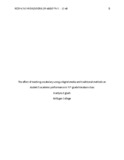The effect of teaching vocabulary using a digital media and traditional methods on student’s academic performance in 11th grade literature class
| dc.contributor.advisor | Kariuki, Patrick | |
| dc.contributor.author | Eglash, Kaitlynn | |
| dc.date.accessioned | 2020-05-28T13:52:20Z | |
| dc.date.available | 2020-05-28T13:52:20Z | |
| dc.date.issued | 2020-05-22 | |
| dc.identifier.uri | http://hdl.handle.net/11558/5124 | |
| dc.description.abstract | The purpose of this study was to examine the effects of teaching vocabulary using digital media and traditional methods on student’s academic performance in an eleventh-grade literature class. The sample consisted of 34 eleventh grade English students; 20 males and 14 females. Data were collected using two English sections of ACT test. Students studied vocabulary for the first section using digital method while they used traditional method for the second section. Data were analyzed using paired samples t-test and independent samples t-test. Results revealed no significant difference was found between scores when students studied using digital methods or traditional methods. In addition, no significant difference was found between the scores of male students and female students when studying using digital methods or traditional methods. Results suggest that teaching vocabulary using digital media and traditional methods did not have any significant difference on academic performance. | en_US |
| dc.language.iso | en_US | en_US |
| dc.subject | Digital methods | en_US |
| dc.subject | Traditional methods | en_US |
| dc.subject | ACT | en_US |
| dc.subject | Vocabulary | en_US |
| dc.subject | Success, academic | en_US |
| dc.title | The effect of teaching vocabulary using a digital media and traditional methods on student’s academic performance in 11th grade literature class | en_US |
| dc.type | Thesis | en_US |

